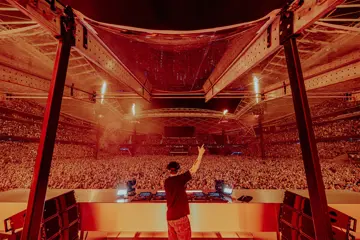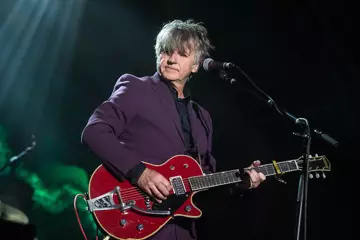It's completely and utterly fair to suggest that US singer-songwriter Ken Stringfellow lives and breathes music. You probably know him best through his power-pop outfit The Posies, who he's co-fronted with Jon Auer since the mid-'80s, or perhaps from his lengthy stint touring and recording with latter-era REM. Maybe it was his stretch playing bass in the second incarnation of legendary Memphis rockers Big Star which caught your eye. Crap, he even spent a while playing guitar with skate punks Lagwagon at the end of last millennium, amongst a vast and disparate catalogue of musical diversions.
But while his current Australian sojourn is chiefly to partake in the orchestral recreation of Big Star's Third/Sister Lovers album for the Sydney Festival, he's taking the opportunity while out here to reintroduce us to his excellent solo canon, by far the most underrated component of his fascinating musical voyage to date.
“The weird thing is that I sort of put less faith in [my solo fare] because I assumed people would gravitate towards the more marquee-worthy names like REM and Big Star, and even The Posies to some degree,” Stringfellow reflects. “I could list 15 things in front of my solo records that people would be much more familiar with – but that's also my fault, because I didn't have the confidence in the past to put the complete faith in my solo work.
“But to be honest, from an artistic point of view it's the thing I've had the most control over in a way – or we could say 'the most hand in', every band is a form of democracy whether that's intended or not; it's at least a compromise – but my solo work is very uncompromised, and I realised putting out the latest one [2012's Danzig In The Moonlight], 'Hey, this is where my focus should be!' The other stuff will take care of itself, and for me [the solo material] paints a much clearer picture of who I am as an artist. If you wanted to get to know me as an artist and figure out what I'm all about, the solo records are the things I'd start with – the other stuff is where I'm like a particular atom in a larger molecule, but here I am the total substance presented,” he laughs. “If that makes sense.”
Don't miss a beat with our FREE daily newsletter
Stringfellow attests that he doesn't invoke a vastly different mindset when writing solo material than he does when composing for other projects, although the solo realm does allow his flair for improvisation to rise to the surface.
“There's more spontaneity with what I do as a solo artist – a lot of the songs, despite the fact that they sound rather composed, are really off the cuff,” he admits. “For example there's a song from [2004 solo album] Soft Commands called Death Of A City, and I was in the studio recording the album and I was out of songs so I was, like, 'Hey I need to write another song. Okay, give me a track in five minutes', and I played this piano part and within ten minutes we had this song written and recorded with the basic track – and then I did a few overdubs and wrote the lyrics – but that was it, I didn't come into the studio with that song even as a demo.
“My whole first album [1997's This Sounds Like Goodbye] was an act of improvisation, where I had to record and write the song in the same go – I couldn't change anything or fix anything, I had to just stick with it. That kind of freedom is less possible in other projects where people are less willing to go into that – that adventurism is really only happening in my solo records which is why I think it's the strongest work. It's got the most chances and the most 'not giving a fuck' vibe.”
While Stringfellow may be visiting in his solo guise he's sharing bills with former The dB's mainstay Chris Stamey, which is sure to liven things up.
“My solo show is sort of idiosyncratic so I'm not sure how much Chris will play with me, but Chris welcomes and thrives on accompaniment so I'm sure to join him for at least some of his set, and then I'm sure things will begin to flow back and forth,” Stringfellow smiles. “I don't think we've done a double bill – not properly – but I've known his music well forever. Chris didn't really know my stuff until we started doing these shows together, and then he was, like, 'Oh wow, there's a whole thing here that I was missing that's really cool!' But you know how it goes – there's only so many hours in the day to get familiar with the billions of hours of music out there.”















